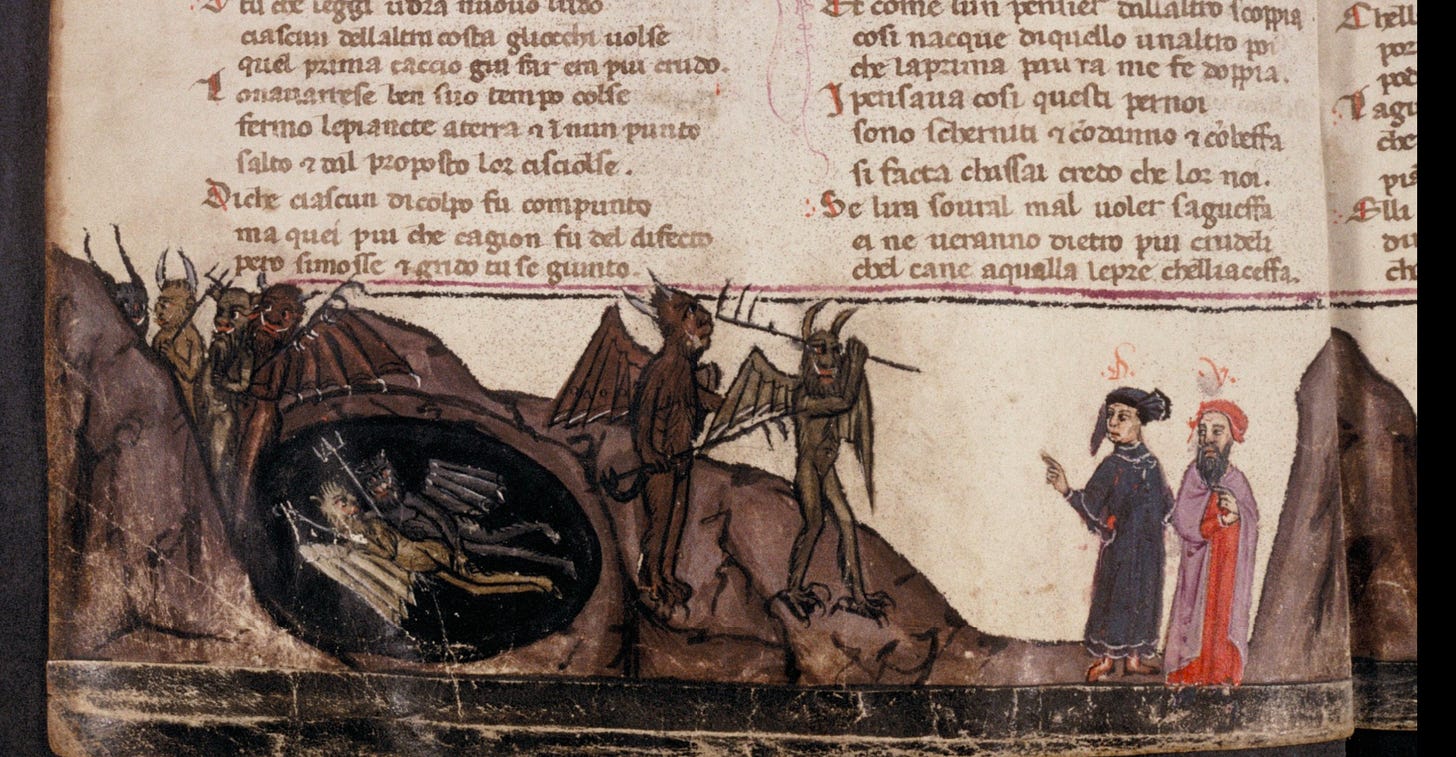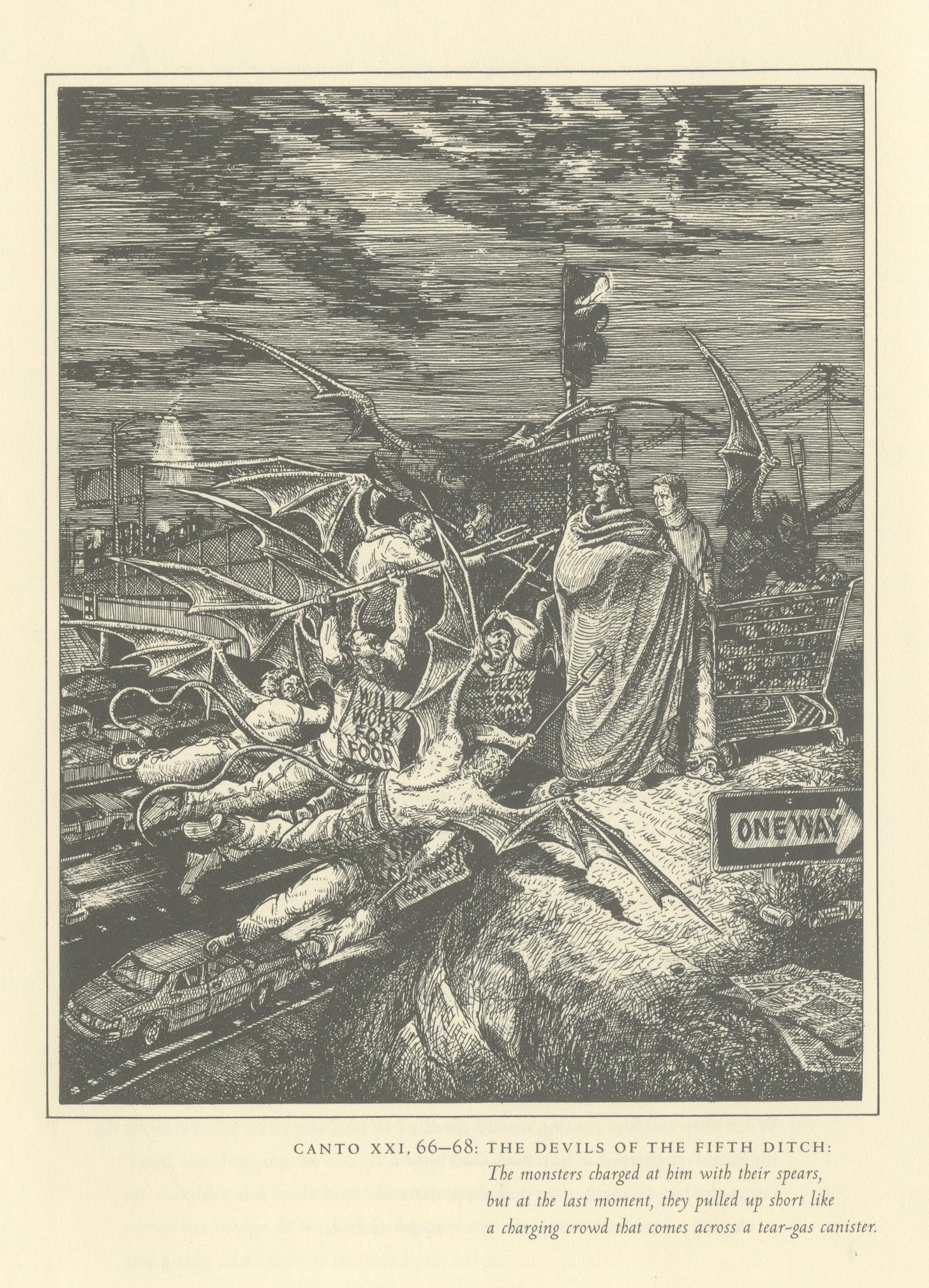The Massachusetts Medievalist on Inferno, Cantos 19-21
This week's cantos form something of an envelope pattern, with simoniacs at the beginning in Canto 19 and barrators at the end in Canto 21 -- both are groups of sinners who profited wrongly, however, and I think it's interesting that those who profit from public business (the barrators) are deeper in hell than those who profit from Church administration (simoniacs). Dante the poet, at least, seems to think that betraying the public trust in the secular realm is a more grievous sin than betraying the trust of the faithful (?). I also want to point out that I find the punishments this week oddly hilarious - the feet sticking up out of the hellish ground to be burned, reverse-headed people stumbling around backwards, and of course the farting demons at the end of 21.

Oxford, Bodleian Library MS Holkham Misc.48, f.34 via ARTSTOR
I was really struck by Kristen's comment last week that Virgil seems to be the hero of our story thus far, and Virgil steps up yet again in 21. He leaves Dante alone so that he (Virgil) can go show the demons who's boss (21.59-). Virgil also seems to have a deep understanding of the power of God that Dante doesn't have (at least not yet)-- one more time, Virgil points out to the inhabitants of Hell that God is providing authorization for Dante to pass, so they had best not interfere.
Furthermore, I'm reading Dante's speech in 19 in the context of our discussions about how parts of Inferno haven't aged well. The conventional analysis of these lines (19.85-) is that Dante the Pilgrim is finding his voice, is starting to regain the confidence of his faith now that we're more than halfway through Hell--Colin mentioned the beginning of this change in his comment last week. Here in the summer of 2020, however, it seems to me foolhardy and smug to be so sure about the immorality of others. Dante says, "Stay where you're held, / For these are your deserved punishments" (19.91-92). Smarmy and self-congratulatory? -yes. Heroic, or even simply admirable? -not for me, not right now.
On a more aesthetic note, did you notice the wonderful similes that Dante employs here? Just as our poet was earlier describing Hell in natural terms we could understand (remember the souls whirling like autumn leaves?), there are some similarly accessible comparisons here in Malebolge. It's gruesome but also very visual that the demons push the souls under the boiling pitch "Just as cooks have their scullions do to steep / The meat well into the cauldron" (21.56-57). For me, this image is also part of the humor of this section: demon as sous-chef.

Birk, the Malebranche, from DigitalDante
Another important literary figure used in 21 is the "catalogue of heroes" -- think of the long list ("catalogue" is the fancy literary term) of heroes at Troy in the Iliad, or the list of Italian warriors in Virgil's Aeneid. Dante provides a list of demon names in 21, simultaneously emulating and satirizing his classical predecessors. The translations of the demons' names can be very entertaining -- Pinsky takes the high road and does not try to translate them, but Scratcher-Dog, Evil-Tail, and Nasty Dragon indicate the cartoon-level humor of this part of Malebolge.
And the final piece of humor is of course the famous demon fart that ends Canto 21. If you're feeling brave, you can google "demon farts" as an image search. As you finished Canto 21, you may not have asked yourself, "But what does a demon fart smell like?" - but the answer to that question, of course, is that it smells like Hell.
Possible item for discussion:
Did you also find these cantos funny? (How) Does humor figure into the Epic or the heroic journey?


I certainly appreciated the comic relief in this week's cantos--I feel like these moments were somewhat necessary for breaking up the monotony of horrific imagery of Dante's Hell. The end of 21 literally had me laughing out loud, especially in how it was phrased in my translation: "His answer was to trumpet through his ass" (21.130). That definitely caught me off guard.
I also appreciated how Dante was flexing his simile muscles in these cantos; in describing the bubbling pitch at the start of canto 21, Dante uses a massive nine-line simile, comparing the sight to the process of Venetian ships being repaired with caulk.
Over the last week, I've also given some thought to the Virgil-as-hero theory. At first I was skeptical because I saw him more as a mentor figure exclusively, and I assumed the fact that he was already damned to Hell while Dante was still living meant that Dante was the hero by default. However, this week I feel like Dante's character regressed in his development, giving Kristen's theory more traction. Dante pities the souls that are doomed to walking backwards, even more so than his own teacher (!) who he met in a previous circle. This struck me as odd because this particular punishment does not seem as harsh in comparison to others we've encountered. Virgil ends up rebuking him for this. Additionally, Virgil leaves a cowering Dante behind again when confronting the devils in the fifth ditch. Whether it is in his judgment of the souls or his overall bravery/strength, this week seems to be a step back for Dante, while Virgil has arguably entered frontrunner status.